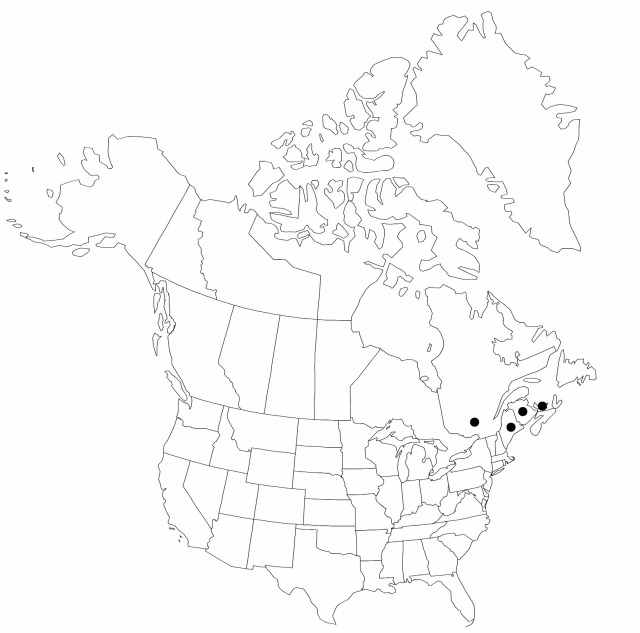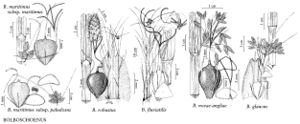Difference between revisions of "Bolboschoenus maritimus subsp. maritimus"
FNA>Volume Importer |
FNA>Volume Importer |
||
| Line 7: | Line 7: | ||
|name=Scirpus fernaldii | |name=Scirpus fernaldii | ||
|authority=E. P. Bicknell | |authority=E. P. Bicknell | ||
| − | }}{{Treatment/ID/Synonym | + | }} {{Treatment/ID/Synonym |
|name=Scirpus maritimus var. fernaldii | |name=Scirpus maritimus var. fernaldii | ||
|authority=(E. P. Bicknell) Beetle | |authority=(E. P. Bicknell) Beetle | ||
| Line 25: | Line 25: | ||
|elevation=0 m | |elevation=0 m | ||
|distribution=N.B.;P.E.I.;Que.;Maine;Europe;s Africa. | |distribution=N.B.;P.E.I.;Que.;Maine;Europe;s Africa. | ||
| − | |discussion=<p>It is possible that the plants here placed in Bolboschoenus maritimus subsp. maritimus were introduced from Europe or were produced in North America by introgression from B. robustus or B. novae-angliae. Some specimens from the northern Atlantic coast are intermediate between B. maritimus subsp. maritimus and subsp. paludosus in having many bifid styles and only a few trigonous achenes. Collections from an abandoned oil-well site in southern Ontario (Lambton County) probably represent introductions from Europe. They have very slender leaves and culms, trifid styles, and narrowly cylindric spikelets. Although these specimens resemble some plants of B. maritimus in the broad sense from southern Europe, as well as B. glaucus × B. maritimus hybrids, they cannot be definitely identified because they lack achenes.</p> | + | |discussion=<p>It is possible that the plants here placed in <i>Bolboschoenus maritimus </i>subsp.<i> maritimus</i> were introduced from Europe or were produced in North America by introgression from <i>B. robustus</i> or <i>B. novae-angliae</i>. Some specimens from the northern Atlantic coast are intermediate between <i>B. maritimus </i>subsp.<i> maritimus</i> and <i></i>subsp.<i> paludosus</i> in having many bifid styles and only a few trigonous achenes. Collections from an abandoned oil-well site in southern Ontario (Lambton County) probably represent introductions from Europe. They have very slender leaves and culms, trifid styles, and narrowly cylindric spikelets. Although these specimens resemble some plants of <i>B. maritimus</i> in the broad sense from southern Europe, as well as <i>B. glaucus</i> × <i>B. maritimus</i> hybrids, they cannot be definitely identified because they lack achenes.</p> |
|tables= | |tables= | ||
|references= | |references= | ||
| Line 49: | Line 49: | ||
|publication year= | |publication year= | ||
|special status= | |special status= | ||
| − | |source xml=https://jpend@bitbucket.org/aafc-mbb/fna-data-curation.git/src/ | + | |source xml=https://jpend@bitbucket.org/aafc-mbb/fna-data-curation.git/src/8f726806613d60c220dc4493de13607dd3150896/coarse_grained_fna_xml/V23/V23_56.xml |
|genus=Bolboschoenus | |genus=Bolboschoenus | ||
|species=Bolboschoenus maritimus | |species=Bolboschoenus maritimus | ||
Revision as of 16:09, 18 September 2019
Scales dark to medium brown. Styles all or mostly 3-fid. Achenes dark to medium brown, obtusely compressed trigonous with broadly rounded abaxial angle or some biconvex in same spikelet.
Phenology: Fruiting summer.
Habitat: Brackish to saline coastal shores and marshes
Elevation: 0 m
Distribution

N.B., P.E.I., Que., Maine, Europe, s Africa.
Discussion
It is possible that the plants here placed in Bolboschoenus maritimus subsp. maritimus were introduced from Europe or were produced in North America by introgression from B. robustus or B. novae-angliae. Some specimens from the northern Atlantic coast are intermediate between B. maritimus subsp. maritimus and subsp. paludosus in having many bifid styles and only a few trigonous achenes. Collections from an abandoned oil-well site in southern Ontario (Lambton County) probably represent introductions from Europe. They have very slender leaves and culms, trifid styles, and narrowly cylindric spikelets. Although these specimens resemble some plants of B. maritimus in the broad sense from southern Europe, as well as B. glaucus × B. maritimus hybrids, they cannot be definitely identified because they lack achenes.
Selected References
None.
